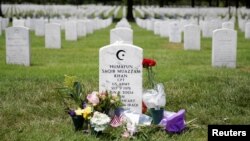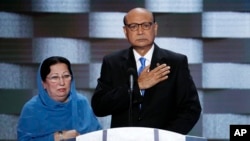The grave of a Muslim U.S. soldier buried at Arlington National Cemetery outside of Washington, D.C., has been getting an unexpected boost in visitors, thanks to what many consider unkind remarks by Republican presidential candidate Donald Trump.
Trump sparked a firestorm when he lashed out at the parents of U.S. Army Captain Humayun Khan after the fallen soldier’s father, Khizr Khan, disparaged the real estate mogul in a speech last week at the Democratic National Convention, saying Trump “sacrificed nothing” for his country and essentially calling him unfit for office.
The two have been embroiled in a war of words ever since.
A by-product of the feud has been a steady flow of visitors to the gravesite of Captain Khan, who was killed in a 2004 suicide car bombing during the Iraq War. They come to pay their respects to Captain Khan, with some laying flowers around his tombstone, which is engraved with a crescent and star, symbols of his Muslim faith.
Cemetery spokesman Stephen Smith told VOA there “certainly has been” more interest, but there is “no way to quantify it” other than seeing more visitors going to Section 60, where Captain Khan is buried.
Arlington National Cemetery, is considered a national shrine for Americans who honorably served in the U.S. military during every war in U.S. history and during times of peace.
Located in the southeastern state of Virginia just south of the U.S. capitol, it is the final resting place for over 400,000 service members, veterans and their relatives.
Eligibility requirements for in-ground burial at Arlington are the most stringent of all U.S. national cemeteries. Those killed in the line of duty or being a recipient of the Medal of Honor, the Purple Heart or certain other decorations are among the many requirements.
In an interview with VOA, Khan’s father, Khizr Khan, described his son’s death, saying he ordered his men to “hit the ground” as he approached “oncoming terrorists” in a car with an outstretched arm.
“As a trained military officer he knew what the danger was, otherwise he would not have ordered the men to hit the ground. That is the message of Islam. That is the message of peace,” he said.
As a result of Captain Khan’s death, his parents and brothers have unwillingly joined the ranks of American Gold Star families, immediate relatives of members of the U.S. Armed Forces who have been killed in combat or in support of certain military activities.
Captain Khan, who was of Pakistani descent, was posthumously awarded the Bronze Star and the Purple Heart after being killed in Iraq. The Bronze Star recognizes “acts of heroism performed in ground combat” by a person in any branch of the Armed Forces.
Initially introduced as the Badge of Military Merit in 1782, the Purple Heart is the nation’s oldest military award. The U.S. Department of Veterans Affairs describes the Purple Heart as “one of the most recognized and respected medals” awarded to service members killed or wounded in war by the enemy.
Captain Khan’s father, a lawyer, said during his speech at the Democratic convention that “Our son Humayun had dreams, too, of being a military lawyer. But he put those dreams aside the day he sacrificed his life to save the lives of his fellow soldiers.”





